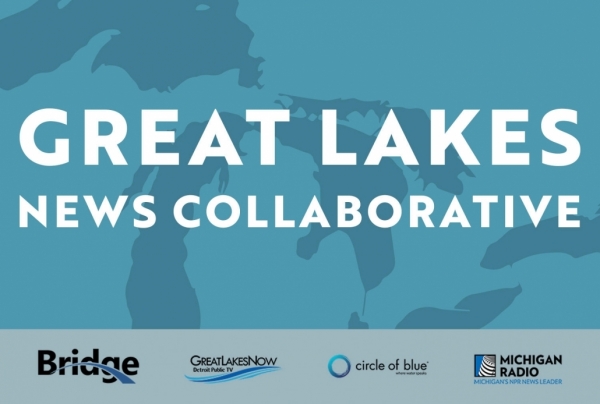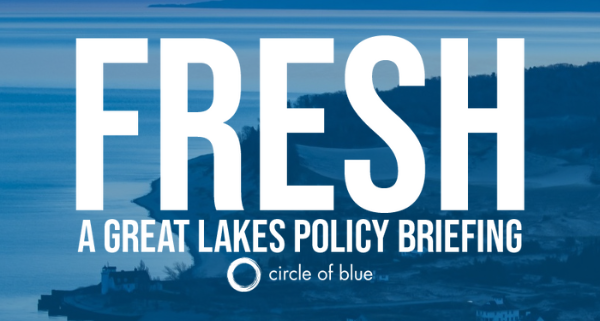Fresh, February 20, 2024: Great Lakes Lawmakers Propose Federal Program to Protect Mississippi River
February 20, 2024
Fresh is a biweekly newsletter from Circle of Blue that unpacks the biggest international, state, and local policy news stories facing the Great Lakes region today. Sign up for Fresh: A Great Lakes Policy Briefing, straight to your inbox, every other Tuesday.
— Christian Thorsberg, Interim Fresh Editor
This Week’s Watersheds
- A Chicago-based non-profit has received a $160 million grant to facilitate the development of new technologies that remove PFAS, chemicals, and minerals from wastewater.
- A proposal to create a federally funded program to protect the Mississippi River is back in front of Congress, after a similar bill from 2021 failed.
- Legislators have proposed an extension and funding increase for the Great Lakes Restoration Initiative, until 2031.
- Wisconsin lawmakers are proposing a new bill that would restart the process for setting PFAS standards in groundwater this year.
Ice cover on the Great Lakes has reached another historic low, measured at just 2.7 percent.
“The main driver is climate, a changing climate, and warming temperatures around the globe.” Andrea Vander Woude, integrated physical and ecological modeling and forecasting branch chief with NOAA’s Great Lakes Environmental Research Lab.
The National Oceanic and Atmospheric Administration has reported new lows for Great Lakes ice cover in mid-February, at just 2.7 percent on February 11. Ice coverage has not been lower at that point in winter since records began in 1973
Ice coverage improved a bit in the last week, but it remains scarce at all lakes. As of February 18, coverage at Lake Superior is 2.6 percent; Lake Michigan 5.3 percent; Lake Huron 12.1 percent; Lake Erie 0.4 percent; and Lake Ontario 0.9 percent.
The amount of ice has dropped by about 25 percent total over the past 50 years, Wisconsin Public Radio reports.
Fresh from the Great Lakes News Collaborative

- Environmental group sees some shortcomings in governor’s proposed budget — Michigan Public
- Teachers and scientists work together on the Lake Guardian — Great Lakes Now
- Whitefish are on brink in Michigan. Can they learn to love rivers to survive? — Bridge Michigan
The Great Lakes News Collaborative includes Bridge Michigan; Circle of Blue; Great Lakes Now at Detroit Public Television; and Michigan Radio, Michigan’s NPR News Leader. We work together to produce news and information about the impact of climate change, pollution, and aging infrastructure on the Great Lakes and drinking water. This independent journalism is supported by the Charles Stewart Mott Foundation. Find all the work here.

Mississippi River Restoration and Resilience Initiative Proposed to Congress
Flooding, non-native species, pollution, and saltwater intrusion continue to affect the present, and threaten the future, of the Mississippi River. That is why Rep. Betty McCollum of Minnesota and Sen. Tammy Baldwin of Wisconsin introduced legislation that would create a federally funded program to protect the river, the Milwaukee Journal Sentinel reports.
The Mississippi River Restoration and Resilience Initiative is based on existing watershed protection programs for the Great Lakes and Chesapeake Bay. The Mississippi River program would be dedicated to improving “community resilience to climate change” and “drinking water quality,” restoring and conserving wildlife corridors, preventing the spread of non-native species, and investing in communities where degradation has already hit the hardest.
The bill is similar to one McCollum presented to the House in 2021, and which stalled in January 2023.
In the News
Innovation Hub Funding: Current, a Chicago-based non-profit, has received a $160 million grant from the National Science Foundation to continue developing methods to remove nickel, cobalt, lithium, nitrogen and PFAS from Great Lakes waters, the Hyde Park Herald reports. Affiliated with the University of Chicago, Current plans to repurpose the separated chemicals and minerals “for the production of batteries and other materials-heavy products, such as fertilizer,” in accordance with the grant’s stipulations.
GLRI Extension: Set to expire at the end of 2026, the Great Lakes Restoration Initiative is a 14-year, bipartisan public-private program to protect and restore the Great Lakes. Members of the Senate and House Great Lakes Task Forces last week came together to propose the program’s reauthorization and extension through 2031, WWMT reports. The proposal would also increase the initiative’s annual funding, to $500 million.
Looking Ahead
PFAS Problems: Wisconsin State Sens. Eric Wimberger and Rob Cowles introduced legislation to restart the process to set standards on PFAS contamination in groundwater, after talks in late December stalled, Wisconsin Public Radio reports. The proposal from the two Republicans comes as bipartisan disagreements continue within the state’s government — GOP lawmakers have repeatedly blocked Gov. Tony Evers’s appointees to the state Department of Natural Resources, while Evers continues to withhold $125 million earmarked for local governments to address PFAS contamination in their communities. Democrats argue that the GOP’s proposed PFAS limit “protects polluters” and will undermine the DNR’s authority.
Upcoming Events
February 21-24 — Second Annual Meeting of the Society of Canadian Aquatic Sciences — learn more
February 22 — Call Before You Haul 2.0 – Reducing the Transport of Aquatic Invasive Species via Trailered Watercraft from the Great Lakes Region — learn more
February 22 — Sanctuary Lecture Series: Discoveries in Lake Huron’s Thunder Bay National Marine Sanctuary — learn more
February 28-29 — International Conference on Water Management Modeling — learn more
Other News
East Palestine: One year after a train derailment in East Palestine, Ohio, forced residents from their homes and spread chemical pollution into nearby waterways and land, President Biden visited the community and showed his confidence in cleanup efforts by drinking tap water, USA Today reports.
Coast Guard Agreement: The United States and Canadian Coast Guards have renewed their joint icebreaking agreement, which keeps the two countries’ water bodies clear for shipping and trade, the Times of Northwest Indiana reports.
Christian Thorsberg is an environmental writer from Chicago. He is passionate about climate and cultural phenomena that often appear slow or invisible, and he examines these themes in his journalism, poetry, and fiction.






Leave a Reply
Want to join the discussion?Feel free to contribute!